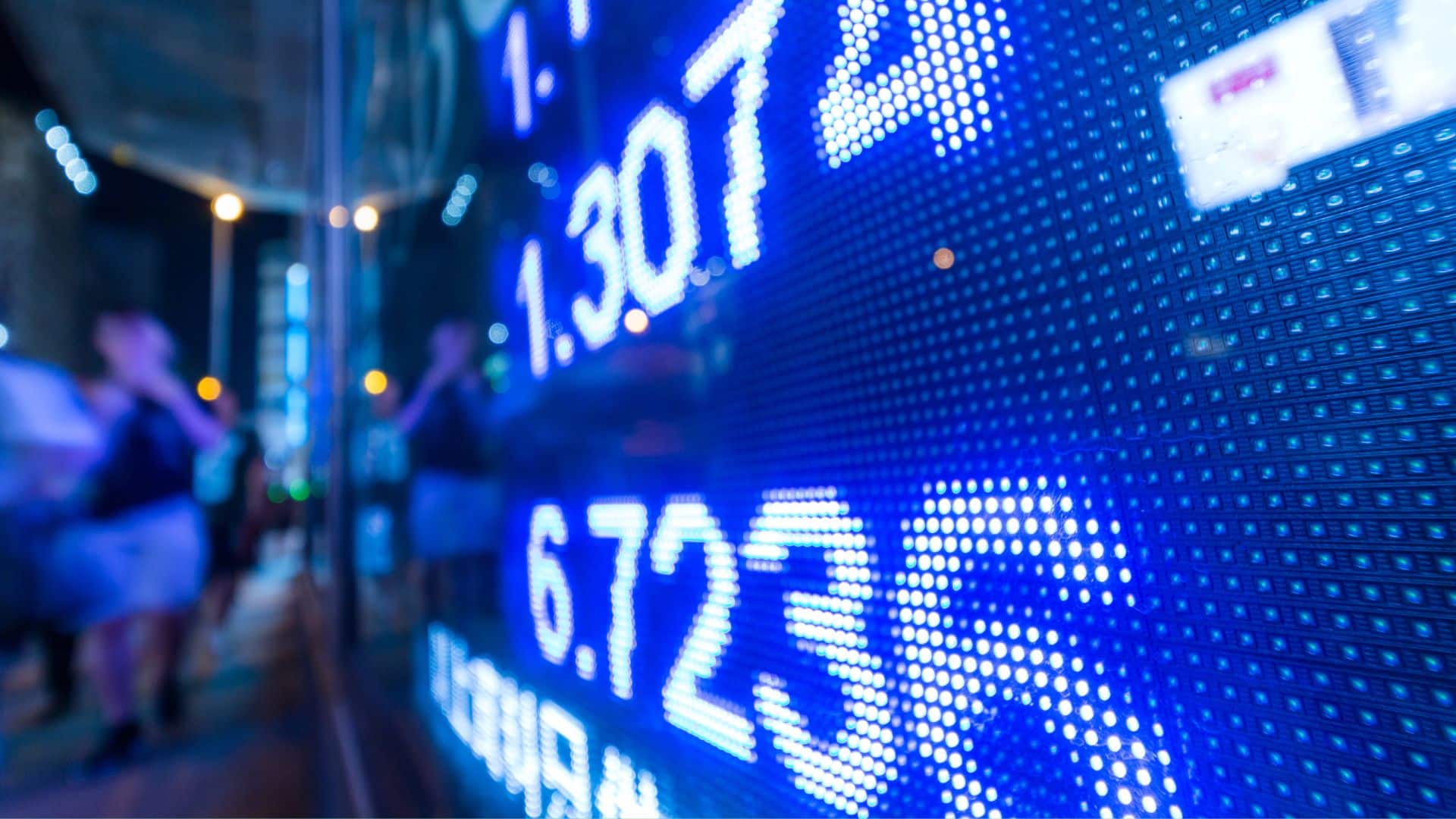Financial markets are so connected war, drought or flood in one country could sink an economy halfway across the globe. Or not. How does that work?

Digital stock market board.
This article was produced exclusively for News Decoder’s global news service. It is through articles like this that News Decoder strives to provide context to complex global events and issues and teach global awareness through the lens of journalism. Learn how you can incorporate our resources and services into your classroom or educational program.
When homebuilders in China falter, prices of stocks or bonds can rocket or plummet halfway around the world.
All kinds of breaking news can affect national economies far from where the news is happening: Lebanon’s financial crisis; Chinese spy balloons over the U.S.; earthquakes in Turkey, Syria, Morocco and Afghanistan; tension between Russia and NATO; the collapse of a bank in Silicon Valley; wildfires in Canada and Hawaii; floods in Libya or Greece.
But why does a big story in one country wildly impact financial markets in others while the same news is met with a shrug elsewhere?
Consider that the stock market in the United States, the biggest economy in the world, has remained relatively resilient in the face of inflation, recession fears, higher interest rates, political infighting and geopolitical tensions.
The S&P 500, a broad measure of the U.S. stock market, has risen about 12% since the start of the year. The MSCI World Index — which tracks a group of big companies across 23 developed countries — is up about 11%. And the U.S. dollar is holding firm against a basket of currencies.
To help us understand how and when big news affects national and world economies we turned to a Wall Street veteran, Daniel Lew, a financial analyst with more than 30 years of experience in the investment industry and chief investment officer and portfolio manager at DSS Wealth Management, Inc.
Connecting calamities and markets
News Decoder: 2023 has been a big news year, some of it quite catastrophic — thousands dead in earthquakes and floods, hurricanes destroying hundreds of millions of dollars in property, etc.
Why does some news roil a market on the other side of the world, while another horrific story has a scant impact to stocks and bonds? Why is that?
Daniel Lew: The impact of catastrophic events on global markets depends on their perceived relevance to Wall Street professionals and perception of impact to valuation [of businesses].
When news of a disaster directly affects economic activities, such as disrupting supply chains or causing significant damage to key industries, it can lead to immediate market reactions. Wall Street professionals assess the potential economic consequences, considering factors like the severity of the event, the affected region’s economic significance and the expected duration of the disruptions.
If the event is seen as a short-term disturbance with limited long-term economic implications, the market may experience a temporary dip, but then recover. Conversely, if the disaster is perceived as having enduring consequences, investors might react more drastically, leading to widespread selling.
Additionally, the response often hinges on whether the event aligns with existing market narratives or contradicts prevailing expectations. Unexpected occurrences are more likely to jolt the market.
It’s also important to note that some disasters are covered by insurance or government support which quite often are financially stimulating and provide opportunities to businesses that are positioned to help rebuild the local economy.
As an example, the 9/11 attack at the World Financial Center was highly disruptive as [New York City] is one of the major financial centers. Markets immediately dropped and were even shut down in the short-term, but as the government stepped in to provide support and the Federal Reserve assured monetary stability and liquidity, the markets recovered and rose from the drop and eventually made new highs.
As a second example, the devastating flooding in Libya during September which resulted in over 10,000 killed, while horrific, appeared to have little overall impact to the global stock and bond markets, but it did result in a temporary spike in oil prices as Libya is one of the top oil producers in the world.
The coldness of economics
ND: If something major happens and there is seemingly no market impact anywhere, does that mean that from a purely investment viewpoint, the event or suffering was insignificant?
DL: If something major happens, there is almost always some market impact, but it may not be the markets you are focused on or care about.
It really depends on the event, which markets are immediately affected and the chain of market participants that will be affected. All lives are priceless, and the lack of financial reaction should not be misinterpreted as being heartless or cold. Price action in the markets will depend on whether or not the event materially impacts the supply/demand characteristics in the areas of interest. If the major exports of a country are disrupted, and it is one of the top producers of those exports, then you would almost always certainly see a price adjustment in the prices of those exports.
It’s important to note that global markets tend to be resilient and adaptable to long ongoing sagas. Short-term increases in commodity prices can motivate producers in unaffected areas to invest and increase production. This will increase future supply and reduce future prices. Global diaspora will have gradual, but long-term impact on economies. Markets and market participants adjust to this by determining what disruptions and opportunities result from the shifting population growth and demographics.
When China stumbles the world shakes
ND: China has the second largest economy in the world. If China sneezes and its economic growth slows substantially, does the world catch a cold?
DL: China is a major trading partner to many countries worldwide and if its economic growth slows significantly, it is likely to have an adverse ripple effect on the world economy. However, it’s important to understand what specific parts of their economy have slowed down and whether it is short-term or long-term in nature.
How this all affects young people
ND: When interest rates (the price you pay to borrow money) rise, prices of bonds usually drop and yields rise. Bond yields are what an investor can expect to receive each year until a bond matures. The U.S. Treasury market is the bedrock of the global financial system. Its 10-year bond yields are at 16-year highs. Why are global bond yields rising and why should young people worry?
DL: For younger investors who are building their wealth by saving regularly, rising interest rates offer a nice opportunity to earn a decent yield in money market savings accounts. It’s also important for younger investors to understand how inflation will reduce their future purchasing power by buying longer term assets like stocks.
While many stocks will tend to drop during periods of rising interest rates, accumulating stocks when they are low will yield substantial benefit when they recover. It’s more important for younger investors to adopt a lifestyle that doesn’t require going into debt, and to be able to save and invest regularly, than to worry about short-term volatility in the financial markets.
Questions to consider:
- Why does the stock market in the United States or France care about what happens in the Chinese stock market?
- Think of one major news event that happened in your country recently. Was there a market impact?
- Imagine if the same event happened in another country that you identify. Would you expect the same market reaction? Why or why not?
- Imagine if there was a major earthquake in Taiwan, a country that makes the bulk of the world’s semiconductor chips that power everything from computers to self-driving cars. What market reaction would you expect?

Betty Wong was global managing editor of Reuters from 2008 to 2011, with 29 years of experience at the Wall Street Journal and Reuters. She covered white collar crime on Wall Street from Ivan Boesky to Michael Milken in the 1980s, led U.S. corporate news coverage from the dot-com bubble to rubble and was global equities editor for Reuters.
Read more News Decoder articles about economics:
